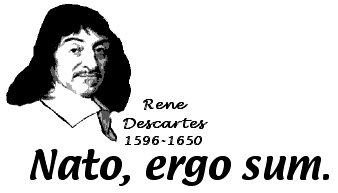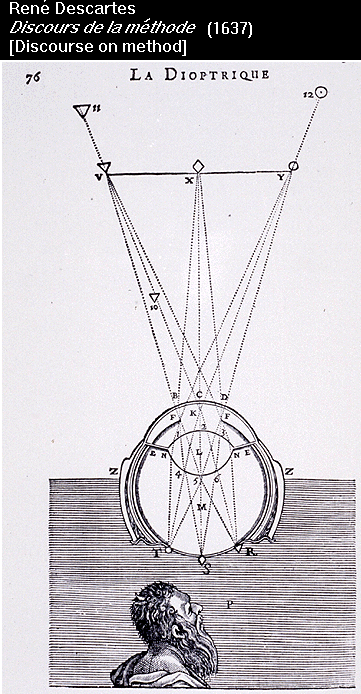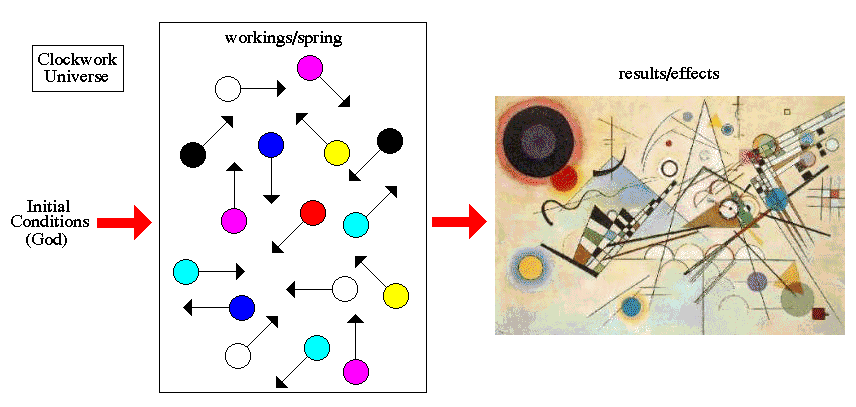



The French philosopher and mathematician Rene Descartes challenged old ways of thinking about science. Descartes, for whom the Cartesian system of philosophy is named, argued that doubt and reason are both necessary for determining truth, and that the world and everything in it operates according to mechanical principles.
And, in the context of this class, this is his most important thought:
By a method I mean certain and simple rules such that, if a man observe them accurately, he shall never assume what is false is true. |
What is being stated here?

As a multitude of laws often furnishes excuses for vice, so that a state is much better governed when it has but few, and those few strictly observed, so in place of the great number of precepts of which logic is composed, I believed that I should find the following four sufficient, provided that I made a firm and constant resolve not once to omit to observe them.
Descartes' mechanical philosophy was to completely revolutionize science, and thus have far-reaching religious implications. The organic world view of Aristotelianism had been constructed in terms of sympathies, correspondences, purposes and the notion of 'form' as distinct from 'matter'. This was to be replaced with a vastly contrasting mechanical view:
In addition, Descartes argued for the conservation of motion. At creation, God had injected a certain amount of motion into the universe and this total quantity of motion had been conserved ever since.
Descartes also pronounced that a vacuum was impossible: Motion is transmitted from one object to another by contact, and there are no empty spaces between. What seems to us empty space is merely extremely extended, fine matter.
One of the most dangerous implications of Descartes' mechanical universe is that it raises sensitive questions about God's relationship to nature |
What is the dangerous implication here?
Descartes' was quick to draw a parallel between the role of Ruler and Creator,
 To take the analogy further, just as the king must make sure his laws are obeyed, so God remains to preside over nature.
To take the analogy further, just as the king must make sure his laws are obeyed, so God remains to preside over nature.
Descartes' belief in the existence of a rational human soul is based on the principle of the indivisibility of the human ego and underpinned by an unquestioning acceptance of the fundamental beliefs in one's own existence and the existence of God.
For Descartes the human body and the human mind were discrete entities. The human soul, unlike the mechanical world, was something that could not be broken down
One of the most challenging attacks on this aspect of Descartes' system was that if mind and matter are so radically different, how do they interact? Descartes' reaction to this criticism was that the pineal gland in humans formed a point of interaction between body and soul.
The inadequacy of this explanation was highlighted by the discovery that the pineal gland is also present in dogs, while Descartes had preserved the rational soul for only the human species.
the world is a Machine, but we must not forget that there is a Mechanic and that He designed the Machine for purposes which we might try to understand and that He is always present to supervise and maintain it
|
Summary of the Mechanical Philosophy:
2) God originally created the world by putting matter into motion according to certain laws; time took care of the rest; everything is matter in motion.
3) Only two real or primary substances in the universe
b) mind (res cogitans)-- non-extended and immaterial; endowed in each of us by God, is what makes us individuals, (much like a rational soul);
4) Cartesian dualism  mind and matter completely separated
Mind is rational, matter is inert, lifeless, passive
mind and matter completely separated
Mind is rational, matter is inert, lifeless, passive  spirituality of the Earth completely removed now!
spirituality of the Earth completely removed now!
5) Nature is only this lifeless matter in motion; What we call "life" is merely an epiphenomenon of this
matter in motion; it is not intrinsic to nature. We can call things "living," but what we really mean is that
their parts are so disposed as to behave automatically in accord to physical laws of necessity;  e.g. The Clockwork Universe
e.g. The Clockwork Universe
6) Humans distinct from Nature: Only man is endowed with mind, could act freely, but only as a mind in
an automaton; animals do not have minds or reason; they are nothing more than elaborately contrived
machines or automatons  The Hierarchical
World View
The Hierarchical
World View